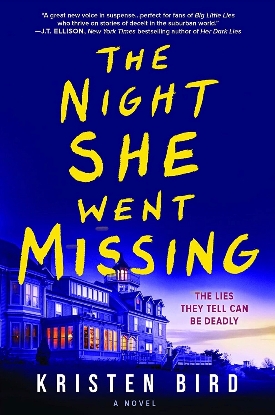 Synopsis:
Synopsis:
Emily is a popular and bookish senior at her family’s Callahan Preparatory Academy in Galveston. But she goes missing after a night out with friends. She was last seen leaving a party with Alex, a football player with a dubious reputation.
No one is talking.
Three mothers — Catherine, Leslie and Morgan — have their lives turned upside down as they are forced to look to their own children, and each other’s, for answers to the questions they don’t even want to ask.
Each mother is convinced she knows who is responsible for Emily’s disappearance. But they all have their own secrets to keep . . . and reputations to protect. And the lies they tell themselves and each other have the potential to be lethal.
The Night She Went Missing is filled with intriguing, twisty domestic suspense. In her debut novel, author Kristen Bird examines loyalty and deceit in a tight-knit Texas community . . . where parents are known to behave badly and people are not always who they appear to be.
Review:

Bird says inspiration for the story came when she and her students read How A Young Woman Lost Her Identity, by Rachel Aviv, in The New Yorker. Hannah Upp was spotted in the water by the Captain of a Staten Island ferry twenty days after she went missing. Sunburned and pale, she knew her name and her mother’s telephone number but had no idea how she ended up in the water. A teacher, she was anxious to get her classroom set up, completely unaware that she had been missing for three weeks. One night, she announced that she had been at a lighthouse before falling asleep again. Later, she had no memory of a lighthouse. Doctors concluded that Upp experienced a rare dissociative fugue, usually brought on by trauma, during which an individual loses memories of their life and identity. Sometimes, they assume new identities and establish new lives, even in new locales. (Author Kerry Lonsdale wrote about a character who suffered from a dissociate fugue in her bestselling Everything trilogy, particularly in the second installment, Everything We Left Behind.) For Bird, Hannah’s experience spawned numerous what-ifs that serve as the foundation of the tale she tells in The Night She Went Missing.
The book opens with a first-person prologue related by Emily. She describes being found face-up in the Galveston harbor on the morning of her funeral. She conveys that, despite being aware of all that is happening around and to her, she is unable to move or speak. From there, Bird whisks readers back several months and employs third-person narratives to present the perspectives of the remaining key characters.
Catherine Rubisi is a disgraced composer and music educator. She plagiarized a student’s work and, when her unethical conduct was discovered, resigned her university position. With her husband, Carter Callahan, a corporate attorney, she has returned to Galveston from Oregon, along with their daughters, Emily, and eight-year-old twins Lucy and Olivia, who are in third grade, Carter is the son of Rosalyn Callahan who runs Callahan Preparatory Academy, an exclusive school attended by the children of wealthy and influential parents. Stephanie Morgan Frasier, the divorced mother of Alex, has been dating Robert Steele, the handsome neurologist she’s had a crush on since she was a freshman and he was a senior at Callahan Prep. Alex is a charming football player who was accused of sexually assaulting a female classmate at a party three years earlier. The charges were eventually dismissed, but he has lived under a cloud of suspicion ever since. He and Emily have been spending a lot of time together, even though Emily insists they are merely friends and not romantically involved. Morgan is not convinced that Alex’s interest in Emily is only platonic, and has always wondered if her son is capable of an act as heinous as rape. She has always hoped for, but never completely believed in his innocence.
Something happened the night I went missing; one small change affected the outcome of my life’s trajectory.
To Leslie Steele, Rosalyn is “somewhere between a friend and mother.” Michael, her husband and Robert’s brother, succumbed to cancer just under four years ago. Leslie continues to mourn him and suffer from anxiety attacks that manifested shortly after his death. She and Robert were never close while Michael was alive, but since his death, Robert has provided emotional support . . . and prescription medications. Leslie’s daughter, Anna, was the most popular girl at Callahan Prep, but Emily’s arrival has threatened “everything Anna worked her whole life to achieve.” Her dutiful son, Asher, is away at college, studying to follow in his uncle’s footsteps. But his twin brother, Sawyer, distanced himself from his family three years ago. Leslie doesn’t know where he is living or how he is surviving, as he seldom communicates although he does stay in touch with Asher.
Chapter by chapter, Bird advances the story’s timeline while revealing details about the characters’ histories and their relationships with each other. After all, Galveston is a “big, small town” and most of the characters have known each other for years, with several of the parents having attended Callahan Prep together. Only the chapters setting forth Emily’s narration are outside the timeline because, of course, she relates her thoughts from the hospital bed to which she is confined after being rescued. Bird deftly explains how upset Emily was when her parents informed her the family was moving to Galveston, her anger at her mother for making it necessary to leave her school and friends behind, and the difficulties she faced as a new student and granddaughter of the owner of Callahan Prep. Bird deftly establishes the conflicts between Emily and Anna, and Emily’s blossoming friendship with Alex. (“Alex was the only thing about living here, my only friend, the only reason to get out of bed in this awful town some days.) Emily was receiving threats prior to going missing. For example, “This isn’t your school regardless of your name. Go back home.” Who would send such horrible messages? Bird’s depiction of teenage angst about friendships and the quest for popularity is, not surprisingly, given her experience as a high school teacher, credible and compelling. She also discloses details about the fractured relationship between Leslie and Sawyer, as well as Morgan’s childhood as the daughter of an addicted mother and her efforts to hide the truth from her friends. And describes a disturbing watershed event that permanently strained Catherine and Rosalyn’s relationship.
Bird skillfully amps up the book’s dramatic tension when Emily goes to a party but fails to return home. Carter is notified that her abandoned car was located with her cell phone inside it, which explains, in part, why she did not respond to frantic messages. The last person to see her alive? Alex.
Because readers know all along that Emily is alive, the mysteries at the heart of the story center around where she was during the weeks she was missing, who was responsible for her disappearance, and why she failed to contact her family to let them know she was all right. Additionally, because she explains at the outset that she is unconscious and cannot communicate, her medical future is uncertain. Will she regain consciousness? And, if so, will she remember what happened to her during all those weeks she was unaccounted for?
Bird keeps the story moving forward swiftly, accelerating the pace as the pieces of the puzzle begin falling into place. And it turns out to be a very clever story with surprising plot twists and unexpected revelations. But the most interesting aspect of the tale is the various ways in which the mothers — Catherine, Morgan, Leslie, and Rosalyn — react to Emily’s disappearance, view their own children, and connive to protect them. At that point, the effort Bird has expended to immerse readers in those characters’ backgrounds, struggles, secrets, and conflicts with each other pays off because their fears, reactions, and, in some cases, machinations have context and are believable. Even relatable, as grudges are put aside and alliances formed for the sake of finding a missing child. Bird inspires readers to ask themselves how far they would go to protect a child suspected of playing a part in the disappearance of a peer, especially if they, like Morgan, doubt their child’s innocence. Her heartbreaking but engrossing conundrum is examined with authenticity and tenderness. “Morgan recognized her desire for Emily’s return for what it was: utter selfishness. If Emily returned, she would finally be able to set to rest her concerns about Alex’s involvement with the Wagner girl three years ago. She would finally have the peace of mind that all mothers deserve when thinking of their children. She would finally know that Alex wasn’t a rapist, wasn’t a murderer, wasn’t a filthy degenerate.”
Did Emily experience a dissociative fugue state? Her experiences and interactions while her parents and friends are desperately searching for her are touching, and compassionately described by Bird. If she was in a fugue state, what triggered it? Was it initiated by trauma? The whole truth, once revealed, is quite shocking and unexpected, showcasing Bird’s storytelling prowess.
The Night She Went Missing is an impressive freshman domestic thriller that leaves readers wanting to read more from the very talented Bird.




Comments are closed.